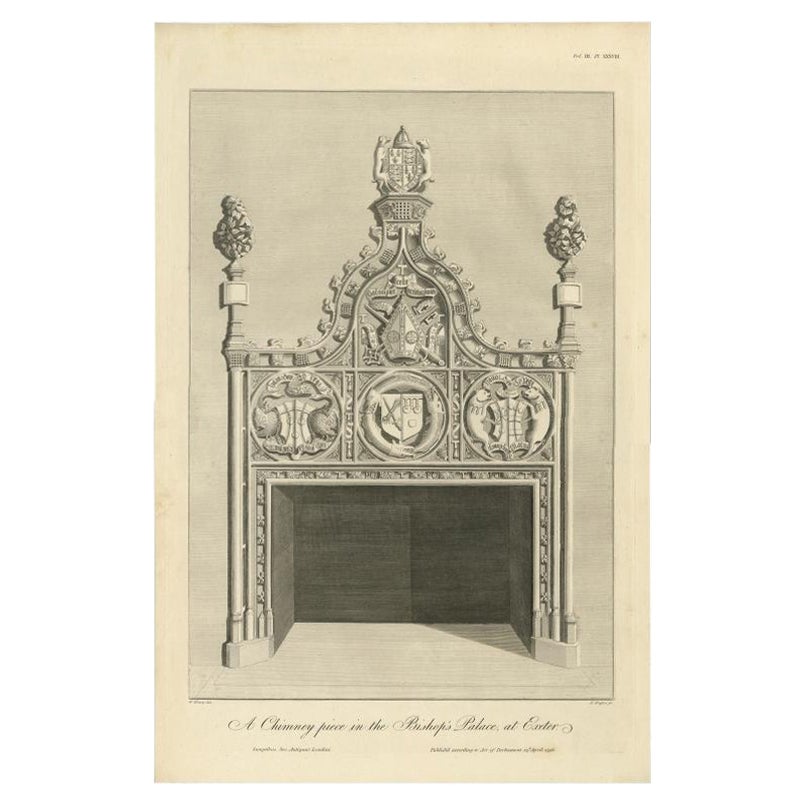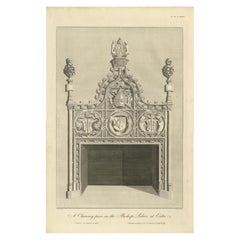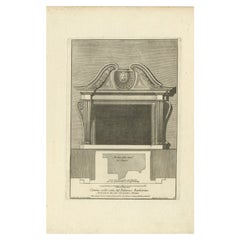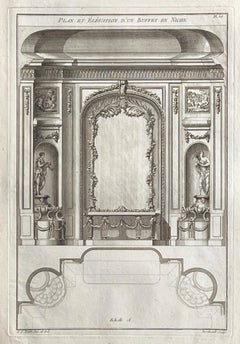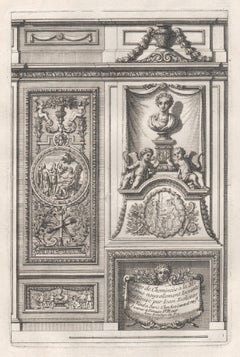Items Similar to James Basire engraving Bishop's Palace Exeter England 1796 Chimneypiece
Want more images or videos?
Request additional images or videos from the seller
1 of 6
James Basire engraving Bishop's Palace Exeter England 1796 Chimneypiece1796
1796
$306.44
£225
€263.67
CA$429.55
A$473.27
CHF 244.99
MX$5,698.25
NOK 3,102.18
SEK 2,914.31
DKK 1,968.82
About the Item
James Basire (engraver) after W Davey (illustrator)
Chimneypiece in the Bishop's Palace, Exeter
50x33cm (to plate mark)
Engraving
Published by the Society of Antiquaries 23rd April 1796
A member of the Society of Antiquaries, Basire specialised in architectural prints. He was appointed as engraver to the society, much of his finest works being found in their Vestuta Monumenta. Basire's father Isaac was a cartographer, and both his son and grandson were called James and also worked for the society. William Blake was apprenticed to Basire for seven years.
About the Seller
4.8
Vetted Professional Seller
Every seller passes strict standards for authenticity and reliability
Established in 2014
1stDibs seller since 2017
360 sales on 1stDibs
Typical response time: 6 hours
- ShippingRetrieving quote...Shipping from: London, United Kingdom
- Return Policy
Authenticity Guarantee
In the unlikely event there’s an issue with an item’s authenticity, contact us within 1 year for a full refund. DetailsMoney-Back Guarantee
If your item is not as described, is damaged in transit, or does not arrive, contact us within 7 days for a full refund. Details24-Hour Cancellation
You have a 24-hour grace period in which to reconsider your purchase, with no questions asked.Vetted Professional Sellers
Our world-class sellers must adhere to strict standards for service and quality, maintaining the integrity of our listings.Price-Match Guarantee
If you find that a seller listed the same item for a lower price elsewhere, we’ll match it.Trusted Global Delivery
Our best-in-class carrier network provides specialized shipping options worldwide, including custom delivery.More From This Seller
View AllChimney Piece in the Bishop Palace at Exeter (1797), engraving by James Basire
Located in London, GB
James Basire & William Turner Davey
A chimney piece in the Bishop's Palace at Exeter
Engraving
45 x 60 cm
This engraving was originally published by the Society of Antiquaries of...
Category
1790s Realist Landscape Prints
Materials
Engraving
Plan of the Rood Loft in St George's Chapel (1790), engraving by James Basire
Located in London, GB
James Basire & Henry Emlyn
Plan and Elevation of the Rood Loft in St George's Chapel at Windsor
Engraving
47 x 55 cm
This engraving was originally published by the Society of Ant...
Category
1790s Realist Landscape Prints
Materials
Engraving
Monument of King Edward IV, Windsor (1790), engraving by James Basire
Located in London, GB
James Basire & Robert Blemmell Schnebbelie
Monument of King Edward IV in St George's Chapel at Windsor
Engraving
50 x 32 cm
This engraving was originally published by the Societ...
Category
1790s Realist Landscape Prints
Materials
Engraving
The Holy Sepulchre at Heckington in Lincoln (1795), engraving by James Basire
Located in London, GB
James Basire & Robert Blemmell Schnebbelie
The Holy Sepulchre at Heckington in Lincoln
Engraving
45 x 30 cm
This engraving was originally published by the Society of Antiquaries ...
Category
1790s Realist Landscape Prints
Materials
Engraving
The Holy Sepulchre at Northwold in Norfolk (1795), engraving by James Basire
Located in London, GB
James Basire & Robert Blemmel Schnebbelie
The Holy Sepulchre at Northwold in the county of Norfolk
Engraving
45 x 60 cm
This engraving was originally published by the Society of ...
Category
1790s Realist Landscape Prints
Materials
Engraving
Tiltey Church, Essex & Rochester Cathedral (1790), engraving by James Basire
Located in London, GB
James Basire & John Carter
Stalls in Tiltey Church Essex & Stalls in the Choir of Rochester Cathedral
Engraving
50 x 32 cm
This engraving was originally published by the Society ...
Category
1790s Realist Landscape Prints
Materials
Engraving
You May Also Like
Antique Print Depicting a Chimney Piece from Exeter, 1796
Located in Langweer, NL
Antique furniture print titled 'A Chimney Piece in the Bishop's Palace, at Exeter'. Antique print depicting a chimney piece.
Artists and Engravers: Made by J. Basire after W. Dav...
Category
Antique 18th Century Prints
Materials
Paper
Antique Print of Palazzo Barberino by De Rossi, c.1710
Located in Langweer, NL
Antique print titled 'Camino nella sala del Palazzo Barberino (..)'. Old print of a fireplace in the hall of Palazzo Barberino, Rome. This print originates from 'Studio d'architettur...
Category
Antique 18th Century Prints
Materials
Paper
Plan et Elevation d'un Buffet en Niche, Roubo French design engraving
Located in Melbourne, Victoria
'Plan et Elevation d'un Buffet en Niche'
French copper-line engraving by Berthault after Andre Jacob Roubo (1739–1791). 18th century laid watermarked paper.
From Roubo's 'L'Art du ...
Category
Late 18th Century French School Interior Prints
Materials
Engraving
Four French Louis XIV period chimney-piece design engravings by Jean Dolivar
Located in Melbourne, Victoria
'Luire de Cheminees a la Moderne nouvellement Invente et Grave par Jean Dolivar.'
Collection of 4 engravings with designs for chimney-pieces. Published in Paris, circa 1670.
210mm ...
Category
Mid-17th Century Baroque Interior Prints
Materials
Engraving, Etching
Monument of King Edward IV – Antique Engraving, St George’s Chapel, 1790
Located in Langweer, NL
Monument of King Edward IV – Antique Engraving of St George’s Chapel, Windsor, 1790
This finely detailed antique engraving shows the monument of King E...
Category
Antique 18th Century English Prints
Materials
Paper
$150 Sale Price
20% Off
William Chambers Georgian Architecture - Chimney Pieces
Located in Melbourne, Victoria
Copper-line engraving by Pierre Foudrinier (1698-1758) after Sir William Chambers (1723-1796), 1794.
Sir William Chambers (1723-1796) was a renown 18th century British architect. He traveled to China, France and Italy before establishing an architectural practice in London. He became Architect of the King's Works and worked for Augusta, Dowager Princess of Wales, making fanciful garden buildings...
Category
Late 18th Century Victorian Landscape Prints
Materials
Engraving
More Ways To Browse
Antique Engraving Plates
Banksy Monkey
Roy Lichtenstein Mirror
Chez Panisse
Jason Alexander Art
Rome Architecture Prints
Used Manhole Covers
Chez Panisse Poster
Gross Domestic Product Banksy
Alex Katz Woods
Beast Interiors
Leon Gaspard
Alma Jones
Blues Vintage Guitars
David Hockney Chair
Grammar Of Ornament
Owen Jones Grammar Of Ornament
Sean Mellyn
